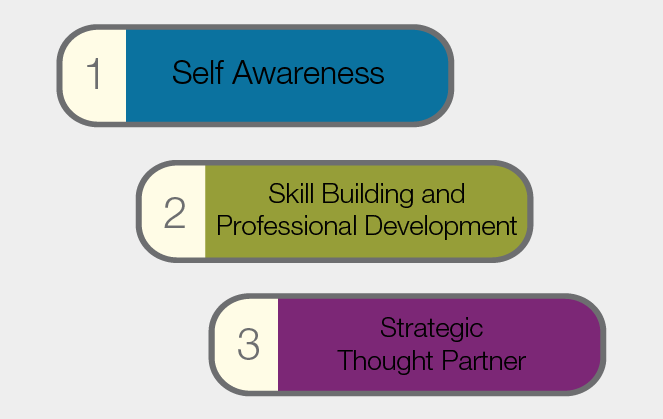Coaching is about developing people. Through executive coaching services, I assess client needs, bring a renewed focus to goals and plans, and develop measurement tools for effective implementation.

Self-Awareness
This critical initial phase lays the foundation for the entire coaching engagement. Self-awareness is essential to lead effectively. No single assessment is comprehensive enough to effectively coach executives; numerous assessments must be used to evaluate behavioral styles, emotional intelligence, strengths, conflict management and other leadership competencies. A 360° assessment is recommended to ascertain the feedback from the candidates’ supervisor, peers, direct reports and external/internal customers that allow me to pinpoint opportunities for development. The primary initial assessments may include DISC, Thomas-Killmann Conflict Mode, Social and Emotional Intelligence Profile, Hogan Assessment System’s Challenge and Potential, Profiles Checkpoint™ 360, TrueNorth Leadership Derailers, StrengthsFinder 2.0, among others as needed.
Interviews may be necessary with the supervisor and colleagues to develop a thorough understanding of the candidate’s leadership capabilities. Other assessments may be given throughout the engagement as well, depending on the unique needs and skills of the candidate. Thought provoking articles are given to the candidate to read and assignments are done between sessions by the candidate to promote a deeper understanding of oneself and others. To promote accountability, I send an email after each session, outlining assignments and their deadlines.
Skill Building and Professional Development
Once the developmental needs of the executive are clarified, I coach the individual through an educational process of developing new skills, learning new concepts, tactics, or desired behaviors, promoting a deeper understanding of critical competencies necessary to achieve the desired outcomes. Individual Development Plans (IDPs) result from understanding the three to five most important goals to further develop the candidate. These written documents are drafted by the executive to provide an outline for mastering critical skills; examples include listening, delegation, employee motivation, communication, collaboration, empathy, behavioral self-control or strategic thinking. Executives are given proprietary research validated tactics and tools to guide critical learning.
Other assessments may be given at this time to further shape learning and fine-tune the IDPs. As progress in skill building occurs, I then transition to timely topics of broader considerations such as employee engagement, developing high performance teams, or the tactics of the charismatic leader. “Homework” is expected between sessions to reinforce best practices from the leadership experts of Harvard Business Review, McKinsey and Company, or MindTools. Depending upon the unique needs of the client, assignments such as rebuilding trust or developing relationships are encouraged and expected. Collaboration can take on many forms including managing up, down and across the organization lines.
Strategic Thought Partner
As goals are mastered and learning occurs, the executive seamlessly moves into the process of reinforcing behaviors learned in the second phase while practicing new competencies necessary for an exceptional outcome. This phase is customized based upon the organizational level of the candidate, organizational culture, progress made on IDPs and the executive’s unique developmental needs for future professional positions. Due to my two decades as a CEO or supervising CEOs, “coaching in the moment,” may mean drawing upon my unique experiences. This may include complexities such managing the board, developing an inspiring leadership style or hiring the right talent.
As part of the natural process of closing the engagement, exploring “what’s next” is crucial for each client, so his or her growth will continue beyond the final coaching session. In these sessions, I explore putting learning to work through cross-functional teams, mentoring, finding a mentor, assignments to develop the strategic mindset, or exploiting one’s internal or external network as means to learn. The final wrap up session includes a one to one with the candidate’s supervisor, followed immediately by time with the client, his or her supervisor and myself. The supervisor must take the lead, along with the candidate, for continued development of the executive. A written Executive Coaching Engagement is produced for the client to record the engagement, as a way to provoke additional learning and keep development on track for continued success.
Learn more about Executive Coaching services and processes on the FAQ page.

